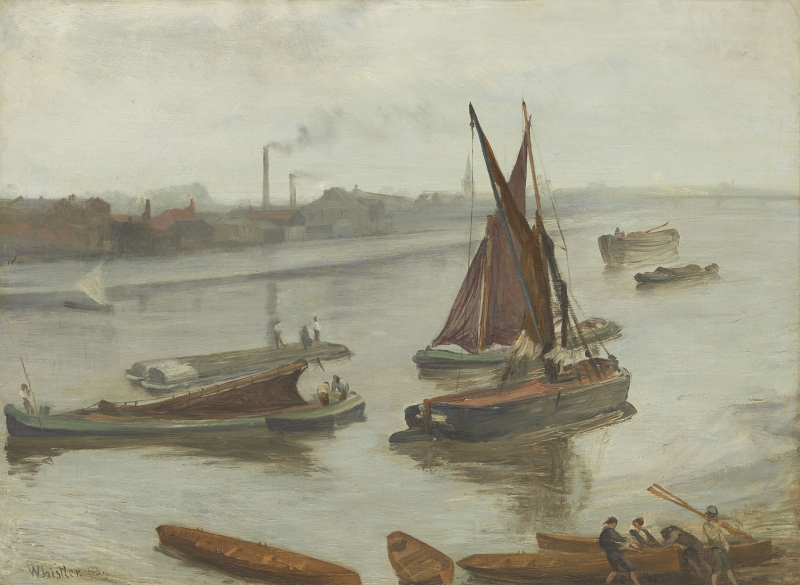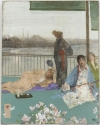Titles
Several possible titles have been suggested:
- 'Battersea' (1867, Royal Academy of Arts, London). 1
- 'Grey and Silver. Old Battersea Reach' (1892, Goupil). 2
- 'Old Battersea Reach' (1892, D. C. Thomson). 3
- 'Grey and Silver: Old Battersea Reach' (1980, YMSM). 4
'Grey and Silver: Old Battersea Reach' is the preferred title.
Description
A view of shipping on a river, painted in horizontal format. On the shore in the foreground are several small boats, with, in the lower right corner, three men launching a rowing boat or skiff, and another man carrying oars. The shipping on the river includes barges in mid-stream, and two sailing barges close in at right. Further out at left are two further barges, one carrying enormous tree trunks; one nearer, at left, is probably moored, with sail lowered, and has a small boat at the stern, possibly unloading goods. On the far shore are riverside warehouses and factories, with two large chimneys to left of centre and a chimney or spire to right of centre. In the distance at far right is a bridge, where the river begins to curve into the distance.
Site
This is a view of Battersea Reach, on the river Thames, London, from Whistler's house in what is now Cheyne Walk, Chelsea. In the far right distance is Battersea Railway bridge, newly opened in 1863. The barges mid-stream are coal-barges that would unload at Johnson's coal wharf downstream from Battersea Bridge, or Druce's jetty near the Greaves' boatyard (the small rowing boats in the foreground probably come from Greaves' yard). 5
Grey and Silver: Old Battersea Reach appears to be a pair with Battersea Reach [YMSM 045], which was, as Lochnan points out, painted from the same viewpoint. 6 They are, in effect, a diptych.
The view is seen in many of Whistler's paintings of the 1860s and 1870s (Chelsea in Ice [YMSM 053], Grey and Silver: Chelsea Wharf [YMSM 054], Battersea Reach from Lindsey Houses [YMSM 055], Variations in Flesh Colour and Green: The Balcony [YMSM 056], Sketch for 'The Balcony' [YMSM 057], Study of Draped Figures [YMSM 058], Nocturne in Blue and Silver [YMSM 113], Nocturne [YMSM 114], Nocturne: Blue and Silver - Battersea Reach [YMSM 119], Nocturne: Battersea [YMSM 120].
Comments
The AIC website references the influence of Jean-Désiré-Gustave Courbet (1819-1877):
'[Whistler] was exposed to the bold realism and thickly impastoed surfaces of the paintings of Gustave Courbet. The older artist’s influence shaped Whistler’s depiction of the Thames River, a subject that frequently appeared in his work after he moved to London in 1863. In this painting, he focused on the river’s industrial nature – boats and barges, laboring men, and smoking chimneys – which featured so largely in urban life. Yet despite the realism of the subject, Whistler unified the composition with deft brushwork and a subtle palette of brown and gray that anticipates his later interest in delicate tonal harmonies.' 7
The influence of Japanese prints has also been suggested.
In Caprice in Purple and Gold: The Golden Screen [YMSM 060], the model sits surrounded by Japanese prints:
'These included Hiroshige’s 1855 colour woodcut Saijo, Iyo Province from Views of Famous Places in the 60-odd Provinces. A richly coloured, bold design, with startling perspective, it is dominated by the fan-shaped curve of a single sail, gathered into the mast like the waist of a robe. In the distance is a mountain, and tiny boats in the bay. Perhaps this provided inspiration for paintings such as Grey and Silver - Old Battersea Reach, where the sails dominate the composition.' 8
Notes:
1: 99th Exhibition of the Royal Academy of Arts, London, 1867 (cat. no. 243).
2: Nocturnes, Marines & Chevalet Pieces, Goupil Gallery, London, 1892 (cat. no. 36).
3: [29 November 1892], GUW #05761.
4: YMSM 1980 [more] (cat. no. 46).
5: Spencer 1990 [more] , p. 54.
6: Lochnan, Katharine, Turner, Whistler, Monet, Art Gallery of Ontario, Toronto; Galeries nationales du Grand Palais, Paris; Tate Britain, London, 2004-2005 (cat. no. 121).
7: Art Institute of Chicago website at http://www.artic.edu.
8: MacDonald, Margaret, 'Whistler and the Thames', in MacDonald, Margaret, and Patricia de Montfort, An American in London: Whistler and the Thames, Dulwich Picture Gallery, Addison Gallery of American Art, Freer Gallery of Art, 2013-2014, p. 23 (cat. no. 27).
Last updated: 5th June 2021 by Margaret












